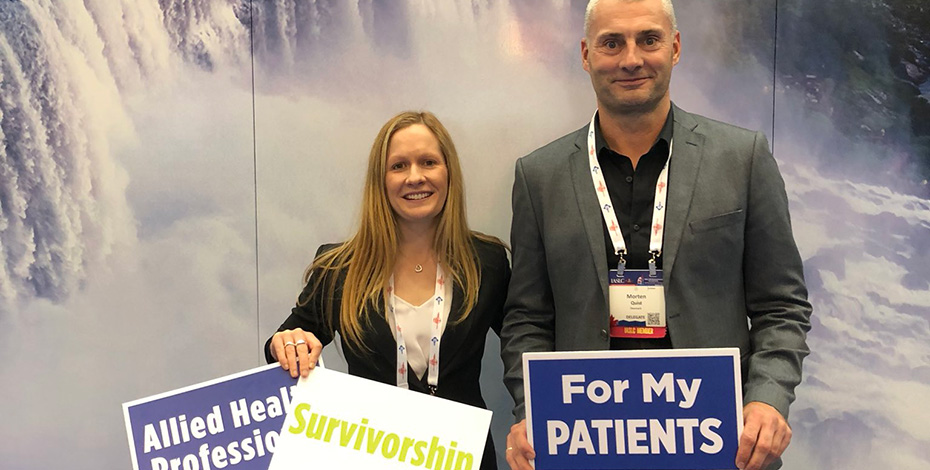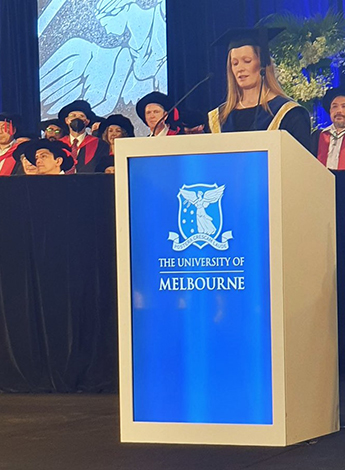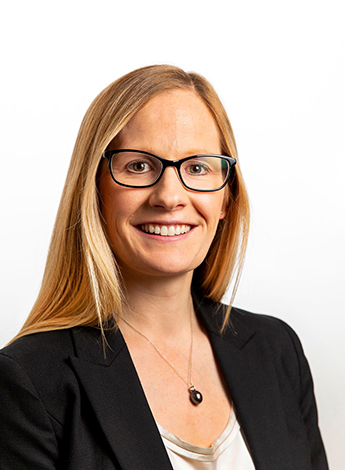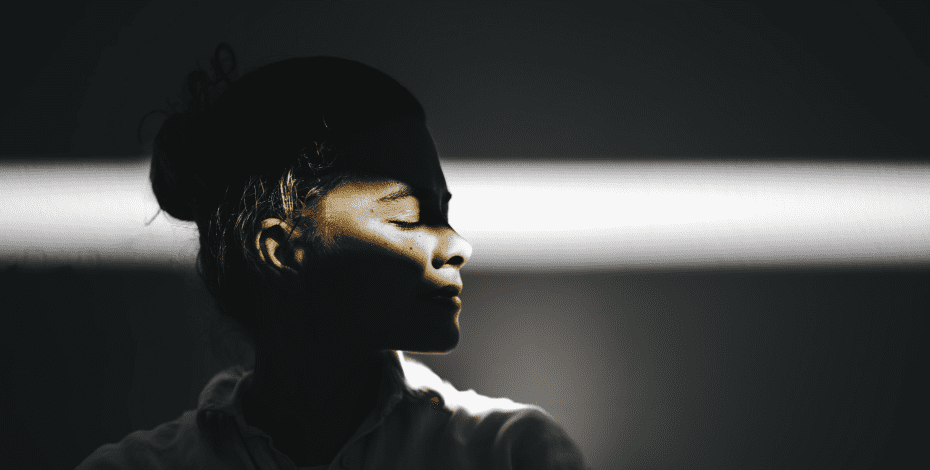
Breathing life into lung cancer research

To coincide with Lung Cancer Awareness Month in November, InMotion speaks with clinician, researcher and educator Catherine Granger, who has spent a significant part of her career treating and evaluating interventions for people with lung cancer who have had, or are recovering from, lung surgery.
The heavy disease burden carried by patients with lung cancer and the capacity for physiotherapy and exercise to make an immense difference to that burden have long been among the drivers behind Associate Professor Catherine Granger APAM FACP’s decades-long work in this field.
But there is also a personal reason why Catherine has doggedly pursued better outcomes for people with lung cancer for more than 20 years.
As a young woman, Catherine experienced the devastating loss of her grandfather Ken Scholz to the disease.
Although the tragedy was not the sole motivation that spurred Catherine into working in lung cancer care, her grandfather’s sudden passing had a profound and lasting impact on her.
His death came at a time when physiotherapy interventions were a far smaller part of enhanced recovery protocols after thoracic surgery.
Even now, the power of exercise for this patient cohort is yet to be fully realised but progress has been made over the course of Catherine’s career.
And she’s been championing it at every turn.
‘I now know there was so much more that physiotherapy and exercise training could have done but my grandfather wasn’t offered any of those services.
'And everything happened very quickly.
'I always think about what this meant for him and his care, had we been able to offer him much better physiotherapy and exercise rehabilitation in the last stages of his life,’ Catherine says.

Catherine delivering the Occasional Address at the University of Melbourne graduation in 2022.
Her insights are built on decades of experience caring for, and leading groundbreaking research about, patients pre- and post-lung cancer surgery.
It is a passion that started for Catherine when she was a new graduate at the Alfred Hospital in Melbourne.
As part of the hospital’s two-year new graduate program, Catherine was mentored by Dr Kate Hayes as she was rotated through many wards, where she discovered her passion for cardiothoracic physiotherapy in particular.
‘It was a fantastic hospital, a great department.
'My first experience was being in a really supportive physio department that was also very social.
'Everyone helped each other in training and in clinical work. And I made very good friends there; I really enjoyed it.
'It’s a very busy hospital with lots of patients, lots of physios, lots of health professionals in general. It was very, very rewarding and you learn really quickly.
'That was the environment I was in,’ she says.
Keen on specialising in cardiorespiratory physiotherapy, Catherine jumped at the chance to apply for a Grade 2 position in thoracic surgery at the Austin Hospital, where she was to spend the next four years honing her skills.
Patients would come into Catherine’s care pre- and post-surgery and she would undertake assessment of breathing as well as exercise prescription and rehabilitation to get patients up, dressed and returning to their daily lives as quickly as possible.
There was also a focus on helping patients regain their strength as they navigated life after surgery.
In 2008, Catherine was awarded a $5000 grant through the Physiotherapy Research Foundation (PRF) to conduct a randomised controlled trial investigating the safety and feasibility of an exercise intervention for patients following lung resection.
It was one of the first studies in the world to assess the safety and feasibility of exercise interventions following lung cancer and it demonstrated that exercise interventions after lung surgery are safe.
The PRF grant led Catherine to undertake a PhD at the University of Melbourne, where the work became a pilot for a subsequent body of research.
‘We piloted an exercise program where participants came into our gym at the Austin to exercise after their surgery.
'It was not a model previously offered; patients would go home after surgery and were not offered anything else.
'We were piloting whether we could get them back into the gym and offer an exercise program afterwards to help with their recovery,’ Catherine says.
‘The PRF grant was a big enabler to give us some clinical time to start doing research when I was just a Grade 2.
'I loved it and thought I could make a big difference. I then enrolled in a PhD alongside my clinical work and the research and have kept going on that pathway ever since.’
As a PhD candidate, Catherine discovered a real passion for research, so much so that she made the decision to transition from clinician to full-time researcher.
She had a lot of support from mentors including Professor Linda Denehy APAM and Professor Sue Berney APAM, both of whom had encouraged Catherine to pursue research within her clinical role as a Grade 2 at the Austin.
Then, in 2013, Catherine took on a Grade 4 position at the Royal Melbourne Hospital as the head of physiotherapy research.
She leads a team of researchers in an active research program focused on exercise, physical activity and patient outcomes for chronic disease populations including those with cancer, critical illness and respiratory disease.
Mentoring and building capacity in others continue to be rewarding parts of her work.
Catherine is also an associate professor of physiotherapy, Dame Kate Campbell Fellow in the Department of Physiotherapy and director of graduate research in the School of Health Sciences at the University of Melbourne.
‘One of the things I really enjoyed during my PhD was starting to support others to do research.
'I liked mentoring and taking students on clinical placements. And that was one of the main reasons I decided to go into academia,’ Catherine says.
‘At the university I teach the physiotherapy students but I actually have a bigger role now in teaching PhD students.
'As the director of graduate research in the School of Health Sciences, I oversee the PhD program for health sciences (allied health and nursing students who are doing a PhD).
'Most are trained clinicians who have come back for a PhD.

Catherine Granger.
'That desire to teach is what drew me to academia and to the job at Royal Melbourne, which is supporting the clinicians doing research.’
Although her research and academic roles meant stepping away from her clinical work (‘I had to give away clinical work just because I couldn’t do everything’), her projects still see her on the wards doing research with patients and working with clinicians in the hospital setting.
‘I feel like I’m still working on the ground clinically, just not with the clinical case load,’ she says.
Catherine was awarded Fellowship by Original Contribution (Research) of the Australian College of Physiotherapists in 2020—a year that was perhaps one of her most challenging.
Having planned to fit in the final year of her fellowship and work while her infant son Charles was in child care, Catherine instead found herself working and caring for Charles in her apartment due to the succession of COVID-19 pandemic lockdowns in Melbourne.
‘I spent a lot of the time writing with him at my feet and my partner at home—we were in a tiny little apartment.
'We weren’t set up for working at home; it was a crazy environment but I’ll never forget the experience of those months of writing during the pandemic.
'Having Charles here was very special; I got all this extra time with him at home,’ she says.
It was also a year where Catherine had to press pause on a huge research undertaking that is only now coming to a close.
For the past five years, Catherine and her team have been conducting a randomised controlled trial called CAPACITY, investigating home-based exercise after surgery for lung cancer.
While the project experienced significant delays due to the COVID pandemic, it is now in the final stages and the results are being eagerly awaited. Watch this space, Catherine says.
‘It was a really big trial. It’s the biggest trial internationally in this specific area in lung cancer.
'Two weeks ago we finished our data collection and I’ve literally just sent off the database to the
statistician.
'So I’m very excited to find out the results.
'We’ll get the first results from this trial, which started recruitment back in 2017, in a few months.
'It’s been a huge piece of work, with lots of team members contributing to it,’ she says.
‘Next year will be about sharing what we found from the trial and working out the next steps if it turns out that it was an effective intervention.
'It’s something that physios can do very easily, a very low resource-intensive program for patients after their surgery.
'But if it wasn’t effective, we need to think about what could be a better model and what we’ll do.
'So we’re at this critical point at the moment of waiting for our results and figuring out the next steps.’
For Catherine, working with patients with lung cancer has been an incredibly rewarding career.
And as a physiotherapist, Catherine is a staunch advocate for this patient cohort, which has a significant disease burden and suffers as a result.
‘With exercise and physiotherapy we can make a big difference.
'I’ve continued researching in this area because it’s a group that is under-researched; they often don’t get a lot of research funding or research attention.
'There’s so much more that we need to do to help support them,’ she says.
‘I think it is important that physios understand how powerful exercise is for this patient group.
'It’s changed a lot during my career. There’s strong evidence that exercise is beneficial and physiotherapy is the perfect profession to be delivering exercise.
'It’s a challenging patient group and there are many things to consider but we get excellent outcomes for patients.
'So for physios, it’s a matter of knowing that there is high-quality evidence that exercise is safe, feasible and beneficial for people with lung cancer at any point along their treatment journey, whether it’s just before they’re starting treatment or during some of the treatments or afterwards.’
The gift of giving back
Having been a member of the APA continuously since 2002, Catherine Granger says that being part of a professional association has had a tremendously positive impact on her professional life.
‘I’m a very strong advocate of the APA and I’ve always been involved with it.
'I think it is so essential for us, as a professional body, to have a group like the APA supporting physiotherapists,’ she says.
‘I always attend the APA scientific conferences. That’s a big part of my learning and they’re events I really enjoy.
'I also go to a lot of other scientific conferences, to disseminate my research, to learn new research methodologies and to meet with people.’
As one of a small number of physiotherapists to attain Fellowship by Original Contribution (Research) of the Australian College of Physiotherapists, Catherine has also been keen to roll up her sleeves and get involved in various volunteer capacities.
She served two terms on the PRF Grants Review Committee from 2015 to 2020 and she became a PRF grant recipient herself in 2008.
And this year Catherine is serving on the College’s Pathways Standing Committee.
‘The thing that amazes me about the PRF is the quality of applications submitted.
'I review for a lot of granting bodies in Australia and overseas now and normally these grants are at least 10 or 20 times the size of the PRF grants.
'But the quality of applications that come to the PRF is just outstanding and they could be going to any international granting body in the world,’ Catherine says.
‘It’s wonderful to see the quality of research that physios do.
'It was very rewarding to be on that committee and to review the applications coming in and hear of the work that physios are doing,’ she says.
© Copyright 2024 by Australian Physiotherapy Association. All rights reserved.





